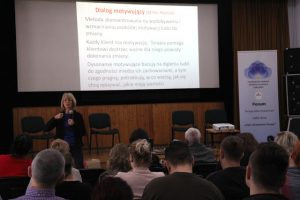On the end of November 2017 one of Barka IS represenative participated in two days Conference about „Styles of Practicing Psychotherapy” as part of the Addiction Therapy Forum Brok. The honorary patron of the conference was PARPA director Krzysztof Brzózka who opened the meeting. One of the speakers was Professor Czesław Czabała who stayed throughout the whole conference and there was an opportunity to celebrate the 50th anniversary of the professor’s scientific work.
The topi c was styles of practicing therapy in various approaches from analytical approach through psychodynamic, humanistic, cognitive behavioral and Gestalt. An important voice that encouraged and supported participants in the changes was the lecture by Jagoda Fudała „Dogmas and paradigmas in addiction therapy”
c was styles of practicing therapy in various approaches from analytical approach through psychodynamic, humanistic, cognitive behavioral and Gestalt. An important voice that encouraged and supported participants in the changes was the lecture by Jagoda Fudała „Dogmas and paradigmas in addiction therapy”
Professor Czesław Czabała ended the conference with a message to therapists about the importance of their work, the need to develop and search for new solutions in the therapy of addicts.
At the conference we have learned that the scheme of stigmatization and labeling towards client is broken. Most important is patient with his capabilities and limitations. On therapist side there is a huge responsibility, attention and exceptional vigilance to give the patient what he needs, what he is ready for, what he is able to take, lift, and not what is needed for therapists. Until recently, the therapist was an unquestionable authority, a specialist who knew everything, who was always right, who knew better what the patient’s goal was and what he needed at the moment. There is still an authoritarian approach in many places where the patient is punished for the symptoms of the disease. Accounting, taking consequences, loading is a well-known procedure. Therapists were taught that the patient must touch the bottom, feel the weight, break it, that this is the only way to sobriety. And each breaking of abstinence was proof that you need to respond more strongly and more radically.
After the conference, we know thet we have to go to the other side of helping. We have to give space to the client so that he can be himself. Coming to therapist with their problems, suffering, difficulties, they expect help and not enforcing immediate change. Therapists have to accompany, help to understand and accept. They have to give space  for talking and experiencing difficult emotions. They cannot force a change,but wait for it. The therapist is not a guru who knows better, knows all the answers. Today, our approach in therapy to the patient is above all accepting rather than confronting and pushing. Today we are accompanying, helping to bring out client potential and strength that will help him build new skills in dealing with his difficulties.
for talking and experiencing difficult emotions. They cannot force a change,but wait for it. The therapist is not a guru who knows better, knows all the answers. Today, our approach in therapy to the patient is above all accepting rather than confronting and pushing. Today we are accompanying, helping to bring out client potential and strength that will help him build new skills in dealing with his difficulties.
